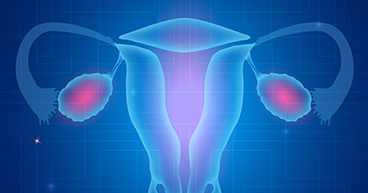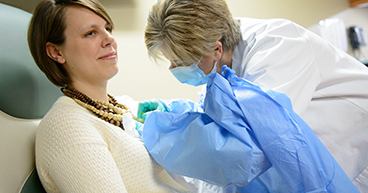
Many women are diligent about eating right, exercising regularly and getting their annual check-ups, which includes screenings for cervical cancer (Pap test) and breast cancer (mammograms). But there is one cancer that is silently killing women: ovarian cancer. Why? Largely because it has no screening test, and women are largely unaware of its symptoms.
In fact, of the five main types of gynecologic cancers—cervical, ovarian, uterine, vaginal and vulvar—only cervical cancer has a screening test. This is why it is vitally important that women recognize the warning signs in order to catch the disease at an early stage.
'The silent killer'
Ovarian cancer is often called the silent killer because its symptoms are easy to overlook or attribute to simply "growing old" in perimenopausal and menopausal women. Symptoms, such as persistent bloating, abdominal pain, acid reflux/heartburn and a change in urinary frequency, sometimes result in tests for unrelated issues, including irritable bowel syndrome or gallbladder disease, thus delaying treatment for the actual cancer.
It is not uncommon for women who are newly diagnosed with ovarian cancer to look back and realize they have been experiencing the symptoms for 12 or more months. Unfortunately, by then, the cancer may be at stage III or IV, further reducing the chances for long-term survival.
Treatment for ovarian cancer is typically done in two stages: debulking, where a gynecologic oncologist surgically removes as much of the tumor as possible, followed by chemotherapy. For patients who are able to undergo both surgery and chemotherapy, the chance for survival past seven years of the diagnosis is greatly increased.
Four tips for early detection
I encourage all women to follow these four tips to help catch ovarian cancer early.
Get a Pap test. While this test will not discover ovarian cancer, it may detect the presence of precancerous or cancerous cells in the cervix. Cervical cancer is the most preventable and treatable form of cancer in women. If all women over 21 years of age received a routine Pap test based on their doctor's recommendation, there would a 90 percent reduction in cervical cancer, according to the U.S. Preventive Service Task Force. It’s important to note that although recommended Pap smear frequency has decreased, it doesn’t mean that women never have to have it again.
Get a rectal exam. Often thought of as "the man's test" because it is used to discover enlarged prostates, a digital rectal exam may also discover abnormalities in women, including ovarian cancer. A digital rectal exam is a good way for a doctor to check female organs, including enlarged ovaries.
Know your body. No one knows you better than you, so if you normally don't have bloating or abdominal pain, let your physician know and get answers. Be your own health care advocate.
Find a specialist. If you are diagnosed with ovarian cancer, it's important to see a gynecologic oncologist, a specialist trained and experienced in treating not only the disease, but the entire patient.



